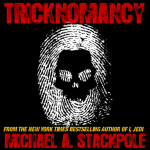Ebook Rentals? I don’t get it.
I’ve been seeing a lot written about how the rental of ebooks is the next big thing on the digital horizon. Most often the argument is framed as “looking for the Netflix of ebooks.” On the surface, when framed like that, the concept is brilliant. After all, look what Netflix did for Blockbuster. Borders is already gone—surely Barnes & Noble is just waiting for a push. A solid rental system could be that push.
Oysterbooks.com and Scribd.com both offer a great deal: all the ebooks you can devour for $10 or less a month. Oysterbooks will allow you to download up to ten books to read offline. Oyster has over 100,000 titles available, and Scribd is working out deals with self-published authors to make their books available. It seems like rental books are poised to erupt.
I have some problems with this idea that I thought I’d share.
1) I don’t really understand the economic model. From what I’ve read, publishers will be paid per rental read (and how that’s defined depends on the lender, but it’s usually a percentage of the book). They’ll get an amount comparable to what they’d get for a sale. That’s got to be somewhere between 30-50% of cover price for that statement to be true. Or, as with Kindle Direct, a portion of the rental money is pooled, and then is doled out in a weighted, pro-rata share depending on the rental book’s price and any sweetheart price support worked into the licensing deal.
The model works only if a) we go with the pool idea, where the service company will get its cut off the top and/or b) subscribers actually read the average number of books or fewer—the average set based on some research from somewhere. (Where they’d get the data, I’m not sure. Amazon’s not coughing up sales numbers for ebooks, and I can’t imagine any publishers are, either.) In Oyster’s case, if a reader can have 10 books in his queue for $10 a month, the publisher will have to be getting less than a dollar per book read, or Oyster loses money.
From a writer’s standpoint, the pool is a pain since a new Harry Potter book, or the next Dan Brown book, will suck all the money out of the pool. Therefore, one month a rental of one of my books is worth $1, and the next month it’s worth 30 cents, through no fault of my own. A flat fee per read works better, but that model could bleed the renting companies dry if readers exceed their expectations in terms of consumption. The companies up the monthly fee or put a limit on available books, resulting in a drop in subscribers. This makes the company more solvent, but lowers their clout in terms of getting special deals because of the number of subscribers they have using their service.
I’m sure much smarter folks than I have worked all these numbers out, but when I can get 70% of cover price or more selling a book, and would have to take significantly less without any guarantee of making it up in volume, I don’t see what’s in it for me.
2) Why rent when libraries lend for free? Ignoring for the moment that there are tons of ebooks available for free on the net (Gutenberg.org, archive.org), local libraries have been making ebooks available for a long time, for free. Why would you pay money for things you can get for free? (Trick question, I know.)
3) The reason I don’t think a Netflix for ebooks will work is because of the nature of how we consume books. Long before Netflix came along, we’d been trained that media (radio, TV, Movies and sporting events) were transient. Miss them and they’re gone. They’re not keepers. While sales of DVDs and tapes allowed people to buy or record shows, the rental for same reinforced the idea that experiencing them is transient. In Blockbuster’s heyday, you had three days to watch a movie. Now if you rent online, it’s as little as 24 hours. There is an etherial quality to passive entertainment that gives it very little weight. If we miss it, big deal. We’ll catch the rerun or borrow it. How many folks have tons of shows on their DVRs that they delete so they can record other shows? Probably the same number that used to tape over old shows for new on video cassettes.
Books have a permanence to them. I submit that if the Netflix model would have worked with books at all, it would have flourished well before Netflix ever touched movies. In many ways, to return to the point above, that’s exactly the function libraries served—and still do for a segment of the population.
But in the USA, a book borrowed from the library is paired with a dozen or so sales. We just like the idea of owning books. We’ve been trained to like it. We revere the home library. It impresses people. So much knowledge, all there, in paper, available at a moment’s notice. Not every book we read will we keep, mind you, but those we do keep, we love obsessively.
4) I know that rental books seem like an economic bonanza. Imagine, for $10 you can read 10 books a month! You’d not be wrong in asking yourself “Who has the time to read 10 books in a month?” I agree, which goes to a point that I don’t see made very often.
A person’s book budget is not figured in money alone. Each book is a time commitment. Heft a book and you can estimate how long it will take to read. In terms of entertainment value, most paperbacks come out to around $1 an hour or less for entertainment. But books are not meals. They don’t go bad if you don’t consume them all at once. Which is why we all have stacks of books on bedside tables that we’re only part of the way through. We can pick them up any time we want and continue the adventure; and the delay between reading sessions can be minutes, days or even years.
And that’s not counting the books we use as mental comfort food. Those we consume in tiny bits, here and there, over years and years.
My point here is this: books demand a time commitment which ignores the calendar. A rental plan is based on the calendar. There’s a basic disconnect there which, I think, is going to require a couple of generations to restructure—and since I don’t see anyone making a valid effort at restructuring it, the clock on those generations hasn’t started ticking.
5) Unless I’m misreading contracts, I don’t see where publishers have secured the rights to rent my books out. I suspect there will be lawsuits launched in the future to determine how that shakes out. However, that doesn’t mean that writers should decide, right now, what we want to be paid for rental rights to our books. Frankly, we all know that the 25% of ebook income we’re offered in contracts now is ridiculous, even shameful. Since publishers are doing exactly zero work to earn this income, I think a 75% shot to the author (reversing the ebook split) is a good place to start. And we might as well stake our claim now, since publishers won’t decide on what to offer us until after rental books take off, much in the same way they waited for the ebook market to ripen before they came in lockstep to offer us the 25%.
Fact is, I don’t know if rental ebooks will take off or not. I think one hedge authors can do to compete there is to do what I do with my ebooks. Sure, the basic edition of a book is available for rental, but the deluxe or super-deluxe version is purchase only. Heck, one could even put a coupon code for the latter in a rental book so readers come back to your site to make the purchase.
Rental ebooks may have a future. I just don’t think it’s one that any of us have imagined yet.
Creating blog posts about the business of writing cuts into my fiction writing time. If you find posts like this useful, and haven’t yet gotten yet snagged my latest novels, please consider purchasing a book. Nice thing about the new age of publishing is that you become a Patron of the Arts, letting writers know what you’d like to see more of simply by voting with a credit card. (Authors charge less when they sell direct, so you save, we make more, and that frees us to write more.)

Tricknomancy is a braided novel. That’s author for a serial story told through a number of shorter pieces that all come together as a novel. Think of it in terms of a television series. This is series one, consisting of seven episodes. The stories feature Trick Molloy, a magick-using, ex-cop who left the force because he was framed for being a dirty cop. He now works as a bouncer in a strip club, helping friends, solving murders and dealing with an insane family, most of whom would like to see him dead or worse. It’s available for the Kindle, and for sale directly off my website for any epub compliant ereaders.



 21. Jan, 2014
21. Jan, 2014 








Comments are closed.